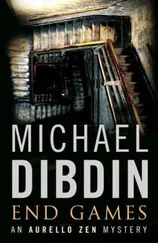Michael Dibdin - Cabal
Здесь есть возможность читать онлайн «Michael Dibdin - Cabal» весь текст электронной книги совершенно бесплатно (целиком полную версию без сокращений). В некоторых случаях можно слушать аудио, скачать через торрент в формате fb2 и присутствует краткое содержание. Жанр: Полицейский детектив, на английском языке. Описание произведения, (предисловие) а так же отзывы посетителей доступны на портале библиотеки ЛибКат.
- Название:Cabal
- Автор:
- Жанр:
- Год:неизвестен
- ISBN:нет данных
- Рейтинг книги:5 / 5. Голосов: 1
-
Избранное:Добавить в избранное
- Отзывы:
-
Ваша оценка:
- 100
- 1
- 2
- 3
- 4
- 5
Cabal: краткое содержание, описание и аннотация
Предлагаем к чтению аннотацию, описание, краткое содержание или предисловие (зависит от того, что написал сам автор книги «Cabal»). Если вы не нашли необходимую информацию о книге — напишите в комментариях, мы постараемся отыскать её.
Cabal — читать онлайн бесплатно полную книгу (весь текст) целиком
Ниже представлен текст книги, разбитый по страницам. Система сохранения места последней прочитанной страницы, позволяет с удобством читать онлайн бесплатно книгу «Cabal», без необходимости каждый раз заново искать на чём Вы остановились. Поставьте закладку, и сможете в любой момент перейти на страницу, на которой закончили чтение.
Интервал:
Закладка:
‘This is Grimaldi,’ he said, his voice hoarse with excitement. ‘Tell the chief to get over here immediately! And you’d better notify His Excellency.’
Aurelio Zen, on the other hand, was to remember that particular Friday as the night the lights went out.
His first thought was that it was a personal darkness, like the one which had descended without warning a few months earlier on poor Romizi. ‘Come on, Carlo, at least try and look like you’re working!’ one of the other officials had jeered at the sight of the Umbrian frozen at his desk, a grey, sweating statue of flesh. Romizi had always been a laughing-stock in the Criminalpol squad. Only that very morning Giorgio De Angelis had retailed yet another apocryphal story about their hapless colleague. ‘Romizi is detailed off to attend a conference in Paris. He rings the travel agent. “Excuse me, could you tell me how long it takes to get to Paris?” “Just one moment,” says the travel agent, reaching for his time-table. “Thanks very much,” says Carlo, and hangs up.’
But Romizi’s fate hadn’t been funny at all. ‘A clot on the brain,’ the doctor had explained when Zen looked in at the San Giovanni hospital. When asked what the prognosis was, he simply shook his head and sighed. Anna, Romizi’s wife, and his sister Francesca were looking after him. Zen recognized Anna Romizi from the photograph of her as a young mother which Carlo had kept on his desk, their twin baby boys on her lap. Now those fresh, plumpish features had been rendered down to reveal the bedrock Mediterranean female beneath, grim, dauntless, enduring. Zen said his piece and left as soon as he could, fearful and depressed at this reminder of the primitive, messy plumbing on which all their lives ultimately depended. It didn’t seem remotely surprising that it should break down without warning. On the contrary, the miracle was that it ever functioned in the first place. In growing panic he listened to the thudding of his heart, felt the blood coursing about the system, imagined the organs going about their mysterious, secretive business. It was like being trapped aboard an airplane piloted by an onboard computer. All you could do was sit there until the fuel ran out, or one of the incomprehensibly complex and delicate systems on which your life depended suddenly failed.
Which is what he thought had happened when the darkness abruptly enveloped him. He was on foot at the time, heading for an address in the heart of the old city. The same raw November evening which had culled the congregation in St Peter’s kept people indoors. The streets were lined with small Fiats parked nose to tail like giant cockroaches, but there was no one about except a few youths on scooters. Zen made his way through the maze of the historic centre by following a succession of personalized landmarks, a painted window here, a patch of damaged plasterwork there, that rusty iron rib to stop men peeing in the corner. He had just caught sight of the great bulk of the Chiesa Nuova when it, and everything else, abruptly disappeared.
In different circumstances the wails, groans and curses that erupted from the darkness on every side might have been distinctly unnerving, but in the present case they were a welcome token that whatever had happened, Zen was not the only one affected. It was not a stroke, then, but a more general power failure, the umpteenth to strike the city this year. And the voices he could hear were not those of the restless dead, seeping like moisture out of the ancient structures all around to claim the stricken Zen as their own, but simply the indignant residents of the neighbourhood who had been cooking or watching television or reading when the lights went out.
By the time he realized this, the darkness was already punctuated by glints and glimmers. In a basement workshop, a furniture restorer appeared, crouched over the candle he had just lit, one hand cupped around the infant flame. The vaulted portico of a renaissance palace was illumined by a bow-legged figure clutching an oil-lamp which cast grotesque shadow images across the white-washed walls and ceiling. From a window above Zen’s head a torch beam shone down, slicing through the darkness like a blade.
‘Mario?’ queried a woman’s voice.
‘I’m not Mario,’ Zen called back.
‘So much the better for you!’
Like a vessel navigating an unfamiliar coast by night, Zen made his way from one light to another, trying to reconstruct his mental chart of the district. Reaching the corner, he got out his cigarette lighter. Its feeble flame revealed the presence of a stone tablet mounted on the wall high above, but not the name of the street incised in it. Zen made his way along the houses, pausing every so often to hold his lighter up to the numbers. The flame eventually wilted, its fuel used up, but by its dying flickers he read a name off the list printed next to the button of an entry-phone. He pushed one of the buttons, but there was no response, the power being dead. The next moment his lighter went out, and his attempts to relight it produced only a display of sparks.
He got out his key-holder and felt the differing shapes and position of the keys. When he had identified the one he was looking for, he reached out both hands and palpated the surface of the door like a blind man until he discovered the keyhole. He fitted the key into it and turned, opening the invisible door into a new kind of darkness, still and dense with a dank, mildewy odour. He started groping his way up the stairs, hanging on to the handrail and feeling with his foot for each step. In the darkness the house seemed larger than he remembered, like the family home in Venice in his childhood memories. As he made his way up the steep flight of steps to the top floor, he heard a male voice droning on, just below the threshold of comprehension. Zen cautiously traversed the open spaces of the landing, located the door by touch, knocked. The voice inside did not falter. He knocked again, more loudly.
‘Yes?’ a woman called.
‘It’s me.’
After a moment, the door opened to reveal a tall slim figure silhouetted against a panel of candle-gleam.
‘Hello, sweetheart!’
They fell into each other’s arms.
‘How did you get in? I didn’t hear the buzzer.’
‘It’s not working. But luckily someone had left the door open.’
He didn’t want her to know that he had keys to the house and the flat.
‘… from the gallery inside the dome. According to the Vatican Press Office, the tragedy occurred shortly after 5.15 this evening, while Holy Mass was being celebrated in the…’
Tania covered Zen’s face with light, rapid, bird-like kisses, then drew him inside. The living room looked and smelt like a chapel. Fat marbly candles flooded the lower regions of the room with their unctuous luminosity and churchy aroma while the pent-roof ceiling retreated into a virtual obscurity loftier than its real height.
‘… where he had been a virtual prisoner since a magistrate in Milan issued a warrant for his arrest in connection with…’
Tania broke free of his embrace long enough to switch off her small battery-operated radio. Zen sniffed deeply.
‘Beeswax.’
‘There’s an ecclesiastical wholesaler in the next street.’
She slipped her hands inside his overcoat and hugged him. Her kisses were firmer now, and moister. He broke away to stroke her temples and cheeks, gently follow the delicate moulding of her ear and gaze into the depths of her warm brown eyes. Disengaging himself slightly, he ran his fingers over the extraordinary garment she was wearing, a tightly clinging sheath of what felt like velvet or suede and looked like an explosion in a paint factory.
‘I haven’t seen this before.’
‘It’s new,’ she said lightly. ‘A Falco.’
Читать дальшеИнтервал:
Закладка:
Похожие книги на «Cabal»
Представляем Вашему вниманию похожие книги на «Cabal» списком для выбора. Мы отобрали схожую по названию и смыслу литературу в надежде предоставить читателям больше вариантов отыскать новые, интересные, ещё непрочитанные произведения.
Обсуждение, отзывы о книге «Cabal» и просто собственные мнения читателей. Оставьте ваши комментарии, напишите, что Вы думаете о произведении, его смысле или главных героях. Укажите что конкретно понравилось, а что нет, и почему Вы так считаете.












